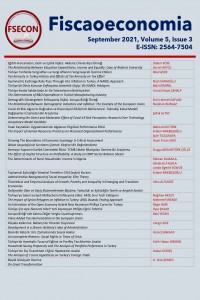Türkiye’de Hanehalkı Tasarruf Eğilimi ve Portföy Tercihlerinin Analizi
Household Saving Propensity and The Analysis of Portfolio Preferences in Turkey
Author(s): Fatih Hakan DikmenSubject(s): Micro-Economics, Regional Geography, Socio-Economic Research
Published by: Ahmet Arif Eren
Keywords: saving propensity; distribution of savings; household budget survey; portfolio preferences;
Summary/Abstract: Savings have a strategic importance regarding to the economic goals of countries because of being a main source of financing for domestic investments. How households evaluate their savings is a problem with micro foundations as well as the size and depth of financial markets. The aim of this study is to statistically analyze the savings propensities and portfolio preferences of households in Turkey. With this purpose, a cross-tabulation analysis was made by associating household saving behaviors with socioeconomic and demographic variables by using the nationally representative "Household Budget Survey" micro data set, which was conducted by the Turkish Statistical Institute (Turkstat) in 2019. According to the findings obtained from the study, the average propensity to save in Turkey during the period examined was 11.6%. However, only about 40% of households can save. Regarding to the distribution of saving, while real estate stands out as the most preferred savings instrument, it is followed by bank deposits, stock and bond investments. This study showed that education and income levels are the variables that have the most important effects on the savings propensity and distribution of households. Accordingly, as the level of education and income increases, the propensity to save also increases. Furthermore, as income and/or education level increases, the share of the stock and bond investments increases categorically. Finally, the lower saving propensity of household heads under 35 and females within their own categories reveals the need for policy implementing for young adults and females.
Journal: Fiscaoeconomia
- Issue Year: 5/2021
- Issue No: 3
- Page Range: 1159-1174
- Page Count: 16
- Language: Turkish

